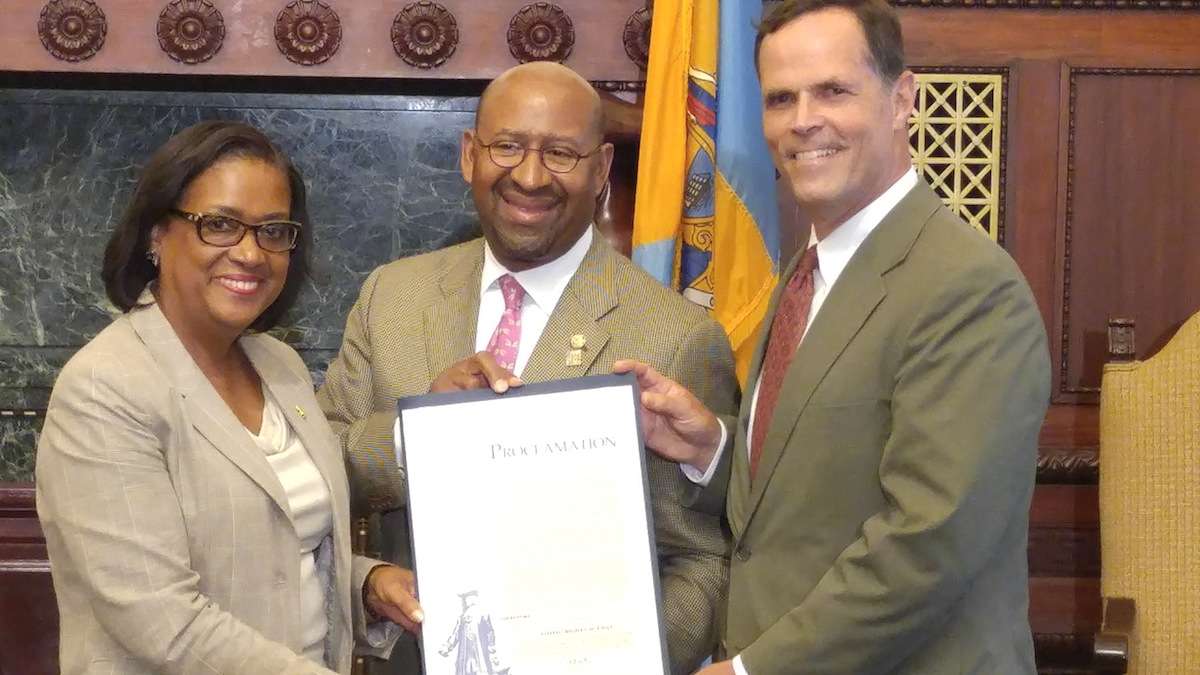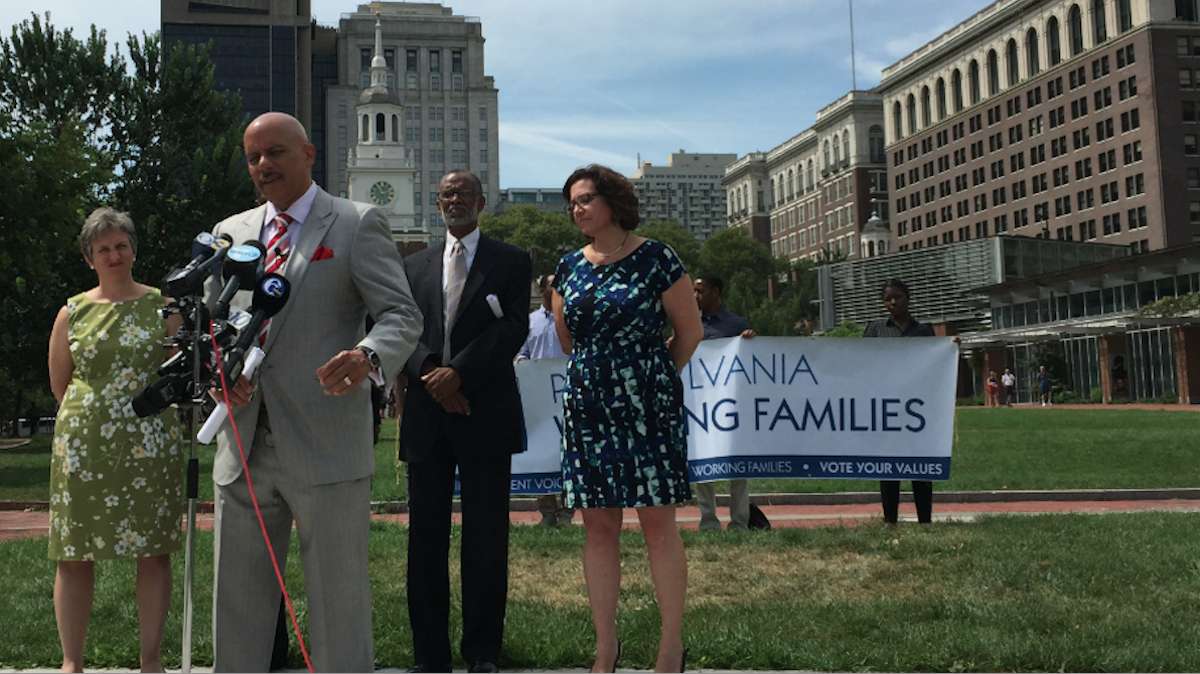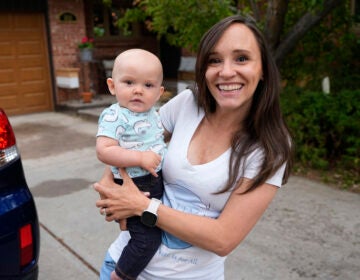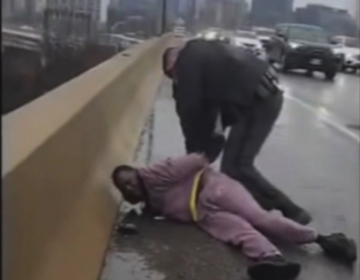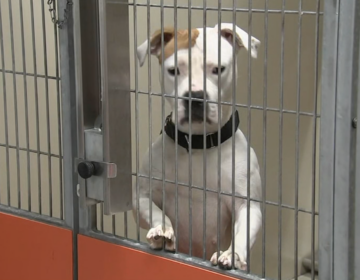As Voting Rights Act turns 50, call for ‘universal, automatic’ registration system rings out [audio]
ListenMoments after the bell struck 11 a.m. in Independence Hall’s clock tower, a group of elected and civic leaders lauded the 50th anniversary of the Voting Rights Act passage, but conceded that registration challenges still linger today.
To that end, state Sen. Vincent Hughes drew attention Thursday to a bill he introduced which aims to “make Pennsylvania a national leader in voter registration by automatically registering any eligible person to vote when they interact with government agencies.”
Senate Bill 806 was also the subject of a March press conference that aligned the push to create a “universal, automatic” registration system with the 50th anniversary of the introduction of a Voting Rights Act that, when signed by President Lyndon Johnson several months later, outlawed discriminatory voting practices.
The bill’s number specifically refers to the Aug. 6 passage date; it was scheduled for formal introduction Thursday after months of input from voting-rights groups to Hughes’ office, spokesman Ben Waxman said.
If passed, the bill would create a process in which anyone who applies for employment with a government agency, admission to a state-owned or operated university, a state license or permit, state program or public benefits would automatically be registered to vote if eligible.
Joining Hughes at the press conference using Independence Hall as a backdrop was bill co-sponsor Sen. Art Haywood, Pa. Working Families Director Kati Sipp, the Rev. Gregory Holston of Philadelphians Organized to Witness, Empower & Rebuild (POWER) and City Commissioner Stephanie Singer.
Their common refrain held that technology makes it possible to do many things, like deposit a check with one’s bank via smartphone, so voter-registration processes should catch up with the times.
The group also called on Congress “to reauthorize the Voting Rights Act in a manner that complies with U.S. Supreme Court rulings.”
“Today is a celebration of the Voting Rights Act’s 50th anniversary, but we remain mindful of the history that followed it,” said Holston, referring to Jim Crow laws and ongoing legal actions including voter ID initiatives which aim to “systemically deny African-Americans the right to vote … and erode the act.”
Hughes concurred that the “Voting Rights Act is under attack slowly, every day, every week, every month and every year with attempts to pull back the rights of people to vote in this nation.”
He said SB 806 represents a fight for new standards that make it easier for eligible voters to register.
For his part, Haywood noted that legislative inaction despite public support for background checks on gun sales, raising the minimum wage and liquor privatization should serve as a rallying cry for more people to get involved in the process.
“Do we need a sit-in movement? Yes,” he said, urging residents to contact elected officials to let them know how they feel about the lack of action on the aforementioned issues, something which Sipp endorsed wholeheartedly.
As for the chances of bill-passage success, Hughes said the process has just gotten started and will still face traditional foes in Harrisburg.
“Hopefully, we can get a vote scheduled before the end of the year,” said Hughes, surmising that it could be addressed after the state budget passes the Legislature.
City Hall ceremony
At a separate afternoon event, the Committee of Seventy and the Urban League hosted a ceremony in the Mayor’s Reception Room at City Hall.
There, Mayor Michael Nutter declared Aug. 6 “Voting Rights Day” in the city. He said the legislation’s anniversary was a “poignant reminder” of what it meant for the country and for him personally and professionally.
“But for the Voting Rights Act, I might not be mayor, or a member of City Council for 14 years, and I might not have been able to run for committeeperson in the 52nd Ward,” he said, noting that “there’s still work left to be done” in the face of attempts to roll back facets of the act.
Speakers also used the anniversary as a springboard to decry “abysmal” voter-turnout numbers despite the fight that led to the Voting Rights Act.
Dr. Martin Luther King Jr.’s “remarks in Montgomery, Alabama, leading up to the passage of the act” were also read as part of the commemoration.
While not in attendance, Democratic mayoral candidate Jim Kenney said through campaign spokeswoman Lauren Hitt that “in light of recent Republican attacks on the protections granted by the Voting Rights Act, today’s commemorations are even more important.
“The campaign’s summer fellowship program is focused around our voter registration drive and giving our fellows the tools to engage their community in the electoral process long after their fellowship ends.”
Republican candidate Melissa Murray Bailey deemed the Act “one of the most notable acts of Congress and a memorable event in the achievement of equality” and also decried low voter-turnout trends.
“It took a lot of people of courage and tremendous sacrifice to achieve these voting rights,” she wrote via email. “People literally gave their lives for that right and now barely a third of people even come out to vote! A great way to honor those who fought is to come out and vote.
“Only by exercising these rights can we overcome the corruption and blatant robbery of taxpayers that’s plaguing our nation, states and cities. Through voter apathy and ignorance, we let politicians use their positions for their own personal gain. We still have a long way to go and we should always be pushing forward to create a society where everyone is treated equally.”
WHYY’s Tom MacDonald contributed to this report.
WHYY is your source for fact-based, in-depth journalism and information. As a nonprofit organization, we rely on financial support from readers like you. Please give today.


